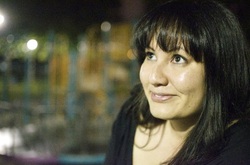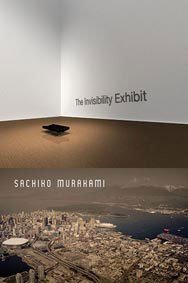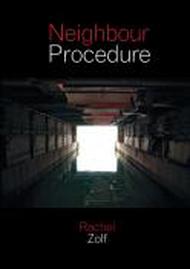 Sachiko Murakami Sachiko Murakami is the author of the poetry collections The Invisibility Exhibit (Talonbooks, 2008), a finalist for the Governor General’s Literary Award and the Gerald Lampert Memorial Award, and Rebuild (Talonbooks, 2011). She has been a literary worker for numerous presses, journals, and organizations, and is Poetry Editor for Insomniac Press. She is the initiator of the online collaborative poetry projects Project Rebuild and PowellStreetHenko.ca. She lives in Toronto. RUSTY TALK WITH SACHIKO MURAKAMI Kathryn Mockler: What is your first memory of writing creatively? Sachiko Murakami: I would write fake diary entries about what me and my friends did after school. I would write these after school alone in my room (often hiding behind a piece of furniture), as I had no friends. KM: Why did you become a poet? SM: Um. See: friendless and hiding behind furniture, above. Clearly I was not going to be a professional soccer player. KM: Could you describe your writing process? (For example, do you write every day? When? Where? How do you approach revision, etc.) SM: Step 1: Find something that hooks a thought into a line. Most often I find this happens while walking in an unfamiliar neighbourhood, reading a poem, waking in the middle of the night, etc. Step 2: Scribble line down (usually on a smudgy receipt, as I am rather bad at keeping notebooks on hand). Step 3: Bring line to page. Step 4: Keep going. Step 5: Revision is an evolutionary process. I wrestle around with the poem for a while, take a break, return, repeat. Then I bring the poem to someone else and watch as they politely break its beautiful legs. Then I begin again. KM: Rejection or criticism can often stop writers before they start. Do you have any advice on how to deal with rejection? SM: Stay open! Prepare yourself for the gifts criticism and rejection are going to give you: resilience, yes, but also a curiosity about your work, and better writing. Invite in editors who will politely break your poem's limbs (the key word being politely). Take a workshop. Start a writing group. Get used to criticism, and use criticism. Listen to the questions that are being asked of your poems. Take the serious questions seriously. Rejection from publishers and literary journals is, for the most part, a numbers game. When I read for literary magazines, there would be a hundred poems submitted for every one page available. If publication is your goal, then try your best to write publishable material. If writing is your goal, then keep writing. KM: You used to co-host the Pivot Readings at The Press Club in Toronto. Do you have any advice or tips for new writers about performing their work in front of audience? SM: Don't: pre-explain your poems, get drunk beforehand, or go over your allotted time. Do: Talk to your audience. Look at them. Invite them in to your poems. Go under time. Then thank your hosts and the bar. KM: From your perspectives as an editor and poet, how would you describe the writer/editor relationship? What should a new writer expect once his or her manuscript is accepted by a publisher? SM: See above re: breaking of limbs, asking serious questions. As an editor, I think I develop a stronger relationship with the manuscript than with the writer. In terms of the publishing process, a first-book author can expect to develop the quality of patience. A manuscript passes through many busy hands before it becomes a book. KM: Can you tell us about your collaborative poetry projects? What got you interested in collaborative poetry? What has the response been? SM: ProjectRebuild.ca began when I invited some poets into a poem about a Vancouver Special (a type of house in Vancouver). I was interested in seeing how they would interpret my invitation to renovate it as they saw fit. I then had a friend, Starkaður Barkarson, create a website in which any of the poems can be "moved into" and "renovated". There has been a tremendous response to this project—over 200 poems on the site from contributors across the world. The source poem, "Vancouver Special", resides in my second collection, Rebuild. PowellStreetHenko.ca is an online renga commissioned by the 2012 Powell Street Festival. A renga is a collaborative Japanese form in which each stanza is written by a new person. This renga expands outwards, as you can respond to every stanza in the poem (not just the last one written, as in a traditional renga). Powell Street Festival is a Japanese-Canadian festival held in Vancouver. They asked me to create something like Project Rebuild for them, and this is what I came up with (along with Starkaður). I travelled to Vancouver this summer to launch the project at the festival, and since then the poem has slowly grown as people reflect on change ("henko"), the theme of the poem. Why do this? I like the idea of putting writing out there that can be taken and messed around with and misinterpreted and reused and repurposed. I like the discomfort it brings. I like prying my writing from my ego's fist. I like conversations. KM: What is your funniest or favourite literary moment that you've experienced. SM: Jacob McArthur Mooney leaving the stage during his reading at Pivot to buy the audience cotton candy from the street vendor passing by on Dundas. No wonder he's the new host. KM: What are you working on now? SM: Poems about airports/the struggle to stay present. A novel about fake orphans. SACHIKO MURAKAMI'S RECENT WORKS  Rebuild, Talonbooks, 2011 Description from the publisher: In a city ironically famous for its natural setting, the roving subject’s gaze naturally turns upward, past the condo towers which frame the protected “view corridors” at the heart of Vancouver’s municipally- guaranteed development plan. But look for the city, and one encounters “a kind of standing wave of historical vertigo, where nothing ever stops or grounds one’s feet in free-fall.” Murakami approaches the urban centre through its inhabitants’ greatest passion: real estate, where the drive to own is coupled with the practice of tearing down and rebuilding. Like Dubai, where the marina looks remarkably like False Creek, Vancouver has become as much a city of cranes and excavation sites as it is of ocean and landscape. Rebuild engraves itself on the absence at the city’s centre, with its vacant civic square and its bulldozed public spaces. The poems crumble in the time it takes to turn the page, words flaking from the line like the rain-damaged stucco of a leaky condominium. The city’s “native” residential housing style now troubles the eye with its plainness, its flaunting of restraint, its ubiquity. What does it mean to inhabit and yet despise the “Vancouver Special”; to attempt to build poems in its style, when a lyric is supposed to be preciously unique, but similar, in its stanzas or “rooms,” to other lyric poems? What does it mean to wake from a dream in which one buys a presale in a condo development—and is disappointed to have awoken? In the book’s final section, the poems turn inward, to the legacy left by Murakami’s father, who carried to his death the burden of the displaced and disinherited: the house seized by the government during WWII, having previously seized the land from its native inhabitants—a “mortgage” from which his family has never truly recovered.  The Invisibility Exhibit, Talonbooks, 2008 Description from the publisher: These poems were written in the political and emotional wake of the “Missing Women” of Vancouver’s Downtown Eastside. Although women had been going missing from the neighbourhood since the late 1970s, police efforts were not coordinated into a full-scale investigation until the issue was given widespread public visibility by Lori Culbert, Lindsay Kines and Kim Bolan’s 2001 “Missing Women” series in the Vancouver Sun. This media coverage, combined with the efforts of activists in political and cultural sectors, finally resulted in increased official investigative efforts, which have so far led to the arrest of Robert Pickton, on whose property the remains of twenty-seven of the sixty-eight listed women were found. In December 2007, Pickton was convicted of six counts of second-degree murder in what had become one the highest-profile criminal cases to take place in B.C.’s history; yet this is not the focus of this book. As the title suggests, the concern of this project is an investigation of the troubled relationship between this specific marginalized neighbourhood, its “invisible” populations both past and present, and the wealthy, healthy city that surrounds it. These poems interrogate the comfortable distance from which the public consumes the sensationalist news story by turning their focus toward the normative audience, the equally invisible public. In the speaker’s examination of this subject, assumptions and delineations of community, identity and ultimately citizenship are called into question. Projects such as Lincoln Clarkes’ controversial Heroines photographic series and subsequent book (Vancouver: Anvil Press, 2002), news stories, and even the 2010 Vancouver Olympic Winter Games circulate intertextually in this manuscript, while Pickton’s trial is intentionally absent. Irritated by complacency, troubled by determinate narrative and the relationship between struggle and the artistic representation of struggle, Murakami is a poet bewildered by her city’s indifference to the neglect of its inhabitants.  Iain MacLeod Iain MacLeod is a film and TV writer from Nova Scotia. Educated at York University and the Canadian Film Centre, where he was captain of the soccer team, Iain’s first TV gig was writing sketch on CBC’s Street Cents. Later he spent six seasons on Showcase’s Trailer Park Boys as story editor and the last four of those as one of the writers too. Since then he has consulted on various shows in development, done some teaching and mentoring and also spent a lot of time thinking about joining the Navy. Most recently his co-written feature comedy Beat Down was produced and will be released in theatres this fall. RUSTY TALK WITH IAIN MACLEOD Kathryn Mockler: What is your first memory of writing creatively? Iain MacLeod: I grew up in rural Nova Scotia, and I can remember playing in the woods a lot and pretending to be a soldier in WW2. I’d make up characters and little story lines. In terms of actual writing-it-down-writing though, I guess that would be writing stories in elementary school. A teacher said to me once I could be a writer. Foolishly I listened to her. KM: When did you first start writing for film/TV? IM: As far back as grade twelve I’d fooled around with video but nothing serious. Then when I finished university I somehow convinced my Mum to loan me a lot of money to make a 48-minute film. That was in 1996 and afterwards I made a few more shorts before getting a job at CBC’s Street Cents in 1999. KM: What inspires the stories you tell? IM: I think it’s a combination of my neurotic brain and the weird area I grew up, New Glasgow, Nova Scotia, which is literally the worst town in Canada (seriously there’s a list and it’s finished last, two years in a row…don’t get too cocky though Toronto you were 47 this year). There’s always something strange going on there and I just love that. So my inspiration is crazy people, myself included? Does that make me bad? It might. I just love people and the nonsense they get up to. Worst species ever…but I love us. KM: Was there a writer or filmmaker that had a big impact on you? IM: All kinds really though I’m not quite sure how each person did. My favourite writer for example is Jane Austen (who is the greatest writer in the history of the English-language and I will fist-fight anybody who disagrees) but I don’t think anyone would see her influence in my writing. Should I just say Quentin Tarantino? KM: What is the writing process like for you when working on your own projects? IM: I love to write but I also hate it…a lot. It isn’t always that much fun and (I hope) like a lot of writers I avoid it as much as possible. If I’m writing a script there’s usually a long drawn out period of making notes, thinking about structure, and so on. Then there’s an outline and that should be followed by a treatment but often isn’t. Finally, I write the script and that can actually happen fairly quickly if I get on a roll. I find a lot of the process is about waiting, staring at the ceiling, searching Wikipedia etc. Not fun. KM: How do you approach revision? IM: With terror. To be fair sometimes it’s not that bad and can even be fun, but I also often feel like “that’s it, I’m done, it’s perfect” when I finish a first draft. And by often I mean always. You have to revise though. I guess? KM: What was the co-writing process like on your feature film Beat Down? IM: My co-writer, Deanne Foley, and I have a very similar sensibility (I don’t know if we’re really funny or not but we find each other hilarious) so for the most part the writing went smoothly. It can be a bit complicated to distribute scenes, acts etc. fairly between two people, but there was a lot of talking things through and knowing where we were going first. It ended up taking 2-3 years in the end, and I think that was both a good thing and a bad thing. On the whole though, it was a great experience. I’ve done co-writing where it’s been wonderful and where it’s been an absolute unbearable hell. Writing Beat Down was the former. KM: What is the biggest difference between writing for film and writing for TV? IM: Other than the paycheque you mean? I guess it’s that a movie ends but you have to keep coming up with new stories for a TV show. That sounds obvious but it is a really hard thing to do (watch The Beachcombers Season 15 for example). Not all show concepts can sustain that. When I pitch TV series I often hear “that’s a movie” so I guess I haven’t really mastered it myself. Another thing is that, at least in Canada, there are far more people weighing in with notes for TV than with film and not always in a good way. KM: When getting notes from producers or story editors, what do you do when you get a note that you don’t like or agree with on your script? IM: I smile and think they’re idiots. That’s actually true. But then if the note’s any good or I respect the person giving it I do seriously consider it, which is something I never used to do when I was younger. Maybe I’m growing up. Ultimately, if you’re getting paid and these are the people who will, hopefully, get your thing made you have to listen. It’s a balancing act though, fighting for your vision on the one hand and hearing different views on the other. It takes a long time to figure that out and given the nature of this business I don’t know that anyone ever does completely. As a general rule though, if you’re getting the same note from different people they’re probably right. Idiots! KM: Do you have any advice for someone aspiring to write for television? What is the best way to break in? IM: I don’t have children but whenever I’m asked this question I feel like that’s what it would be like if I did and they asked me about Santa Claus. I genuinely want to be encouraging, but at the same time the simple truth, which is rarely stated unfortunately, is that writing for TV is highly, even brutally, competitive. And not only is it competitive, but also there isn’t a prescribed path to take to break in. It’s not like being a doctor or a welder or a taxi driver or whatever, where as long as you do certain things it will happen. TV is just so unpredictable. One of the things that’s hurt me (and it is possible I just suck too) is it took me a long time to get my head around that. I was trying to apply my small-town Presbyterian worldview to the industry and it wasn’t adding up. Anyway by all means immerse yourself in TV, try to write a brilliant spec script, talk to as many people as you can who are already in the business and so on but my biggest piece of advice is simply, understand just how unpredictable and ridiculous this business is. It’s probably going to be hard no matter what, but if you don’t have that perspective I’m talking about, it will be much harder. And you’ll probably go completely insane (that isn’t a joke). Of course everything I just said only applies to people who aren’t scumbags. For those of you who are, my advice is much simpler, just keep doing what you’re doing. You’ll go far. I’m totally serious by the way—they have a much better shot. Lucky bastards. KM: What is your favourite moment that you’ve experienced as a writer or filmmaker? IM: I was in a bar in my hometown once talking with some people a buddy of mine knew. They asked me what I did and I told them and one of them quoted his favourite Trailer Park Boys line, a line I’d written. So that’s probably the best moment. Not quite saving the world but I’ll take it. KM: What are you working on now? IM: I have a couple features in development. One of my own, called Soccer Punch, and another with co-writer Ed McNamara, Brobots. I have a few more in pre-development (which is code for I’m not getting paid), and I have some TV pitches I’m working on too. I’m also fooling around with a novel fragment that I wrote when I was in my mid-20s and finally decided to work on again. It’s called Leftovers and is about my hometown (I’m also toying with calling it The Worst Town In Canada). IAIN MACLEOD'S MOST RECENT FILM
 Rachel Zolf Photo by Brian Adams Rachel Zolf’s poetic practice explores interrelated materialist questions concerning memory, history, knowledge, subjectivity, and the conceptual limits of language and meaning. She is particularly interested in how ethics founders on the shoals of the political. Her fourth book of poetry is Neighbour Procedure (Coach House, 2010). Human Resources (Coach House, 2007) won the 2008 Trillium Book Award for Poetry. Zolf recently wrote a screenplay for a film that New York artist Josiah McElheny will show at the 2012 Miami/Basel Art Fair. She is an assistant professor in English and Creative Writing at the University of Calgary. RUSTY TALK WITH RACHEL ZOLF Kathryn Mockler: What is your first memory of writing creatively? Rachel Zolf: I wrote my first poem at a workshop with Di Brandt in Winnipeg in 1990 or thereabouts. Everyone else brought poetry and I brought a failed essay on John Bunyan’s Pilgrim’s Progress that stopped short at the moment Christian became a travailer. The travailer part stuck, though. The point not to get somewhere, but to keep slogging. KM: Why did you become a writer? RZ: My dad hit me with his foolscap when I was a kid. KM: What influences your work the most? RZ: My menstrual cycle. KM: Could you describe your writing/artistic process? RZ: I read. I think. I gather things. I make. KM: In your recent Jacket2 article you mentioned that your work is included in a conceptual writing anthology by women but you don’t consider yourself a part of the contemporary conceptual writing movement. How would you describe your artistic or writing practice or how would you attempt to define it? RZ: Someone called me a conceptual-materialist, which may be mutually exclusive, or not. Like Lisa Robertson, I am a feminist writer, which encompasses a fair bit, but not everything. The label never fits. KM: You often work with pre-existing or found texts. What draws you to creating work in this way? And is it ever a problem in terms of copyright and, if so, how do you get around that? RZ: I am a gleaner (e.g., see Agnès Varda’s film The Gleaners and I), just am. Libel law has scared me more than copyright law so far. KM: What writers would you recommended to an aspiring writer? Or what writers were influential to you when you first started out? RZ: I make work from what I read, and it is a different constellation for each book. I don’t want to name names here because the list is always exclusionary. But I do name a lot of names in my books. KM: What is the funniest moment that you've experienced as a writer or in the literary world? RZ: The poetry world is unfortunately not that funny. It could do with a dose of levity. KM: What are you working on now? RZ: A book of poetry that looks at ongoing colonization in Canada, and a book of essays on philosophy and poetry and the poetics of witness.  RACHEL ZOLF'S MOST RECENT BOOK Neighbour Procedure, Coach House Books, 2010 Description from Coach House Books: Rachel Zolf’s powerful follow-up to the Trillium Award-winning Human Resources is a virtuoso polyvocal correspondence with the daily news, ancient scripture and contemporary theory that puts the ongoing conflict in Israel/Palestine firmly in the crosshairs. Plucked from a minefield of competing knowledges, media and public texts, Neighbour Procedure sees Zolf assemble an arsenal of poetic procedures and words borrowed from a cast of unlikely neighbours, including Mark Twain, Dadaist Marcel Janco, blogger-poet Ron Silliman and two women at the gym. The result is a dynamic constellation where humour and horror sit poised at the threshold of ethics and politics. Rachel Zolf and Judith Butler read "Jews in Space" (from Neighbour Procedure) |
Rusty Talk
Rusty Talk Editor: Archives
November 2017
Categories
All
|

 RSS Feed
RSS Feed
